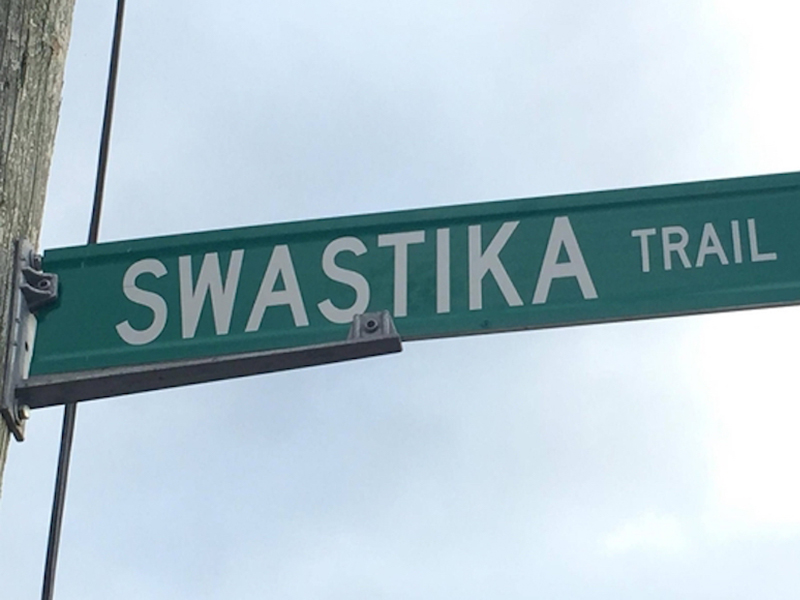Two local residents are taking a small Ontario town to court, over a street name that’s guaranteed to raise eyebrows.
The residents say the name “Swastika Trail” is offensive and that the town’s decision to retain it was flawed.
Randy Guzar, who lives on Swastika Trail in Puslinch, Ont., about 75 kilometres southwest of Toronto, and William Knetsch, who lives in Guelph, Ont., have filed an application for a judicial review of the township’s decision and the result of an earlier vote by the local residents’ association.
The 20-page application filed with the Ontario Superior Court of Justice alleges that by following the results of “an unfair and biased voting process” conducted by area residents, the township’s decision to keep the name was “improper, unfair, unreasonable, unauthorized, invalid and/or illegal.”
The matter goes back to last autumn, when some residents of Swastika Trail raised concerns that the street’s name was offensive and is associated with hate and genocide.
READ: TOWNSHIP’S DECISION TO PRESERVE SWASTIKA TRAIL WAS THE RIGHT ONE
The township urged the Bayview Cottagers Association, which includes residents who live on the private road and surrounding homes, to put the matter to a vote.
On Nov. 1, the association voted 25-20 to keep the name.
After that, B’nai Brith Canada and the Friends of Simon Wiesenthal Centre began pressuring the town council to change the street’s name.
B’nai Brith launched an online petition, saying that despite the swastika’s ancient origins, it remains “unequivocally a modern symbol of racism, hatred and death.”
But some residents argued that the road was named in the 1920s, before the rise of Nazism in Germany, and that the name and symbol were positive messages of peace and auspiciousness for centuries before that.
According to William L. Shirer’s book, The Rise and Fall of the Third Reich, Hitler, a frustrated artist, came up with the design of the Nazi flag – a black swastika on a white disc with a red background – in the summer of 1920.
In late December, the town council voted 4-1 to keep the name.
The application for a judicial review alleges that the township relied on the Nov. 1 vote, which “was plagued by procedural irregularities” and was “not even conducted in accordance with the (association’s) constitution.”
The township “deferred entirely” to the results of the residents’ vote, which was “flawed, procedurally unfair and unreliable,” it continues, alleging that the town council “exercised no independent judgment with respect to Swastika Trail’s name.”
The application argues that the township, not the cottagers association, had statutory authority to decide whether to rename Swastika Trail.
“However,” it continues, “in treating the Nov. 1 vote as binding and determinative, the township illegally sub-delegated its authority to rename Swastika Trail to the cottagers association.”
As for the name itself, “for decades, the swastika has been associated with untold evil, hatred, bigotry and genocide. It was the defining symbol of Nazi rule in Germany – a symbol under which millions of innocent people were murdered,” the application states.
“It is not an historical relic. It remains the hallmark of anti-Semitism and white supremacy today. It is brandished at rallies to promote hateful ideologies. It is painted on homes to intimidate members of the community. The swastika is deeply offensive.”
The legal documents note that at the Nov. 1 meeting, Guzar read a letter from B’nai Brith opposing Swastika Trail’s name, “after initial opposition” from the association’s executive.
In a statement, B’nai Brith Canada CEO Michael Mostyn said “there is no place for a street with the name of a symbol of anti-Semitic hatred in modern Canada, and the irregularities preceding Puslinch council’s vote on this matter must be addressed.”
